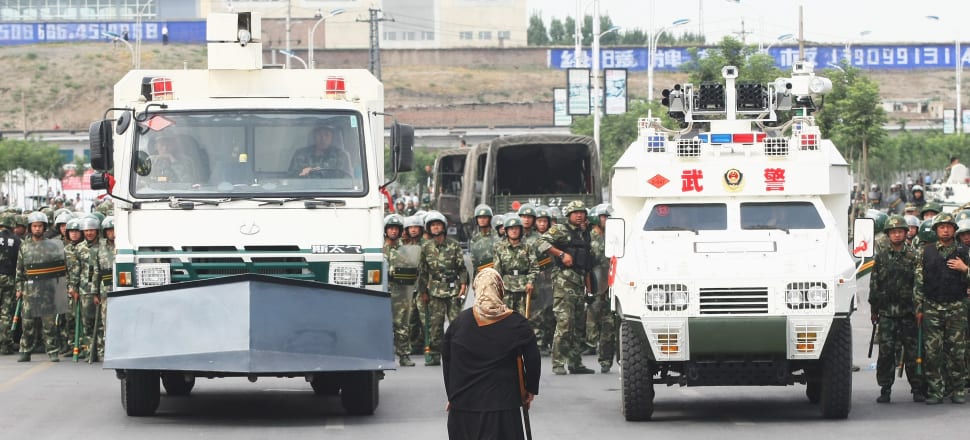
China critiques universal human rights in favour of regional variations, suggesting New Zealand is wrong to be critical of human rights concerns in Xinjiang, Hong Kong, and China more generally
Opinion: Earlier this year, the New Zealand Ministry of Foreign Affairs and Trade (Mfat) published a forward-looking strategic foreign policy assessment. The first of the three “big shifts” identified by the ministry was “a shift towards a ‘multipolar world’, characterised by a period in which rules are more contested and relative power between states assumes a greater role in shaping international affairs”.
Multipolarity refers to an international system in which more than two great powers pursue their interests and compete for influence, but none can dominate the other. Multipolarity also often features “mini-laterals”, small groupings of states arranged around an issue or approach.
READ MORE:
* ‘We must be broke again’ – our China policy is trade
* NZ’s uneasy stability with China
* NZ pushes China on lethal aid concerns over Ukraine war
* Mahuta’s China trip a test of NZ sensitivities
* China envoy: ‘There is no red line redder than the Taiwan question’
The United States remains the most commanding of today’s great powers but there are several other contenders. The first among these is China. For all its economic and development challenges, of which there are many, it is the second largest national economy and has the world’s second largest military budget.
Chinese officials have voiced support for and concern about global governance.
Emerging through violent revolution in 1949, the newly formed People's Republic of China government was excluded from the United Nations until 1971. Its officials were deeply antagonistic toward global capitalism, the ‘Western camp/imperial powers’, and the liberal ideas foundational for post-war international institutions.
In the early 1970s, it took the “China seat” on the UN Security Council and in the 1980s it initiated reform policies and an opening to the world. Officials began to engage tentatively and defensively in international institutions such as the UN and joined the World Trade Organisation in late 2001.
Today, according to Mfat’s foreign policy assessment, “The Chinese Government has more assertively pursued diplomatic, trade, security, and development initiatives aimed at enhancing China’s influence, shaping international approaches, challenging existing international rules and norms, and promoting China’s vision in these areas.”
In September 2023, the Chinese Ministry of Foreign Affairs put forward a proposal for the Reform and Development of Global Governance. This is a collection of already announced positions on international issues, from the war in Ukraine to stability on the Korean Peninsula, and a blueprint of Chinese initiatives to reform global governance.
It argues emerging economies have reshaped the global distribution of power and resources toward a new era of multipolarity that needs to be reflected in global governance arrangements. This presents two key challenges for small liberal democracies such as New Zealand.
First, though there is commonality in the sentiment that global governance is important, such as a commitment to an “open, inclusive, balanced and beneficial” multilateral trading system, there is also considerable difference across several important issues.
The document critiques the universality of human rights, a foundational principle of the Universal Declaration of Human Rights, in favour of regional variations in rights protection based on national conditions, history, and culture. This is the logical extension of the “Chinese-style modernisation” argument.
Moreover, it defends the People's Republic of China record by arguing human rights should not be politicised and used to “contain other countries”, suggesting New Zealand is wrong to be critical of human rights concerns in Xinjiang, Hong Kong, and China more generally.
It takes a challenging position on the debate about responsibility for action on climate change. China is easily the largest national carbon emitter today, emitting more on a per capita basis than most developed countries, including New Zealand, but the proposal continues to stress “common but differentiated responsibilities” and to call on developed countries to “face their historical responsibilities squarely”.
There is also much missing from the document, including a response to longstanding calls from countries such as New Zealand to remove the veto powers of the permanent five UN Security Council members.
It is vague on Russia’s breach of the territorial integrity and sovereignty of Ukraine, the most fundamental principle of global governance. Instead, it blames Europe and critiques countries that have sanctioned Russia, such as New Zealand, for adding fuel to the fire.
Similarly, there is an absence of focus on international law such as the United Nations Convention on the Law of the Sea.
Second, the proposal is rationalised as constructing a “community with a shared future for mankind”, a goal that is highly ambiguous and sits awkwardly or in direct opposition to today’s global governance.
Four initiatives have been put forward to achieve this new community: the belt and road initiative, the global development initiative, the global security initiative, and, most recently, the global civilisation initiative.
Like all great powers before it, these initiatives are shaped by Beijing’s own interests and preferences. These don’t naturally align with our own, but that doesn’t mean they can be ignored. We need to keep China committed to global governance, so it does not go it alone as it did in the 2016 South China Sea arbitration ruling.
That will require understanding what reforms are being proposed, agreeing where we can and pushing back where we must, as well as holding China to account on its existing commitments to global governance.







